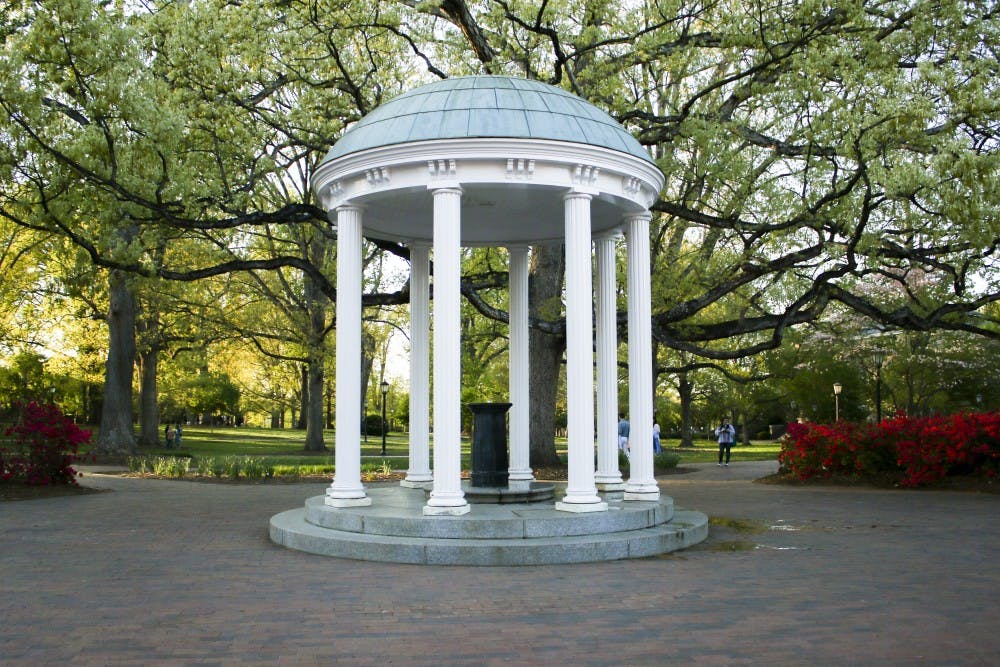“Your letter identifies two activities that you consider to be inappropriate for Title VI funding, out of more than 100 programs that the Consortium organizes or promotes each year,” she said. “Neither of these activities, as it happens, were supported with Title VI funding.
Magnuson provided a list of Middle East-related courses for the fall semester, along with the names of faculty instructing the courses.
The U.S. Department of Education directed UNC and Duke University to revise their joint Consortium for Middle Eastern Studies in order to continue receiving federal funding from Title VI, according to a letter sent to UNC Vice Chancellor for Research Terry Magnuson, dated Aug. 29 and published Tuesday.
The consortium, the Department said, appears to lack balance by placing a positive emphasis on Islam and not other religions, such as Christianity or Judaism. Additionally, the Department said UNC-Duke CMES activities supported by Title VI funds may be unauthorized.
“The Consortium deeply values its partnership with the Department of Education and has always been strongly committed to complying with the purposes and requirements of the Title VI program,” a UNC spokesperson said in a statement. “In keeping with the spirit of this partnership, the Consortium is committed to working with the Department to provide more information about its programs.”
Title VI of the Higher Education Act of 1965, as amended, allows Congress to authorize grants to “protect the security, stability, and economic vitality of the United States” through the teaching of foreign languages and cultural competencies. This, the letter said, is intended to give students the instruction necessary to meet national needs.
The letter said the UNC-Duke CMES used Title VI funds for areas of study including film studies and a conference on “Love and Desire in Modern Iran” that, while relevant in academia, do not clearly benefit U.S. national security and economic stability.
“There is a startling lack of focus on geography, geopolitical issues, history, and language of the area, as Congress required in Title VI,” the letter said.
Maggie Barkowitz is a UNC graduate who majored in Peace, War and Defense, minored in Arabic and attended a variety of events sponsored by UNC-Duke CMES during her time at UNC. She said events and classes without an explicit link to language or national security still advanced the understanding of these issues.
“A big portion of the events are about educating students about the culture of the Middle East, because you can’t become fluent in a foreign language or truly understand national security issues of a region without understanding the culture of that region,” she said.
To get the day's news and headlines in your inbox each morning, sign up for our email newsletters.
As a Jewish student who also took classes that dealt with Middle Eastern Studies at UNC, Barkowitz said her professors never made anti-Semitic claims or insinuations. Regarding the Department of Education’s claims that the consortium is unbalanced toward Islam, she said it made sense to her that the focus of classes was on Islam because UNC’s program is called the Center for Middle East and Islamic Studies — although she never felt that her classes were religiously biased.
The UNC-Duke CMES drew controversy last year after a “Conflict Over Gaza” conference, which some said demonized Israel to the point of anti-Semitism. Ari Gauss, executive director of North Carolina Hillel, said Hillel has repeatedly raised concerns that the consortium allowed programs, such as the Gaza conference, to be used to foster anti-Semitism. Gauss said North Carolina Hillel welcomes the Department of Education’s review of the consortium.
“We believe the Consortium offers an opportunity for rich, nuanced conversation about the complex issues in the Middle East, and hope this action will foster more balanced programming that welcomes multiple perspectives and a more deliberate process for selecting programs and speakers, as well as closer scrutiny by university administrators,” Gauss said in an email.
The UNC Muslim Students Association could not be reached for comment by the time of publication.
Jacquelyn Hedrick, a junior at UNC minoring in Islamic and Middle Eastern Studies, said she believes that the program has made a diligent effort to represent the Israel-Palestine conflict factually. She said the program did not necessarily represent Israel positively, but did present a balanced selection of perspectives on the issue.
This move from the Department of Education, Hedrick said, is a political one aimed at avoiding criticism of Israel because of the United States’ relationship with Israel.
“I think that this attempt to completely erode public discourse at a publicly-funded institution is frightening and it verges on being fascist, all in the name of what is supposed to be national security, but what is really in large part motivated by a desire for wealth,” Hedrick said.
Moving forward, the Department of Education said the UNC-Duke CMES is directed to provide a revised schedule of activities for the coming year, describing how each one promotes foreign language learning and advances U.S. national security interests and economic stability.
The letter said the Department of Education must obligate the funds for the consortium by Sept. 30, so those involved in the consortium must respond with “a preliminary plan and timetable for carrying out the above-specified compliance activities” by Sept. 22.
@maevesheehey
university@dailytarheel.com



